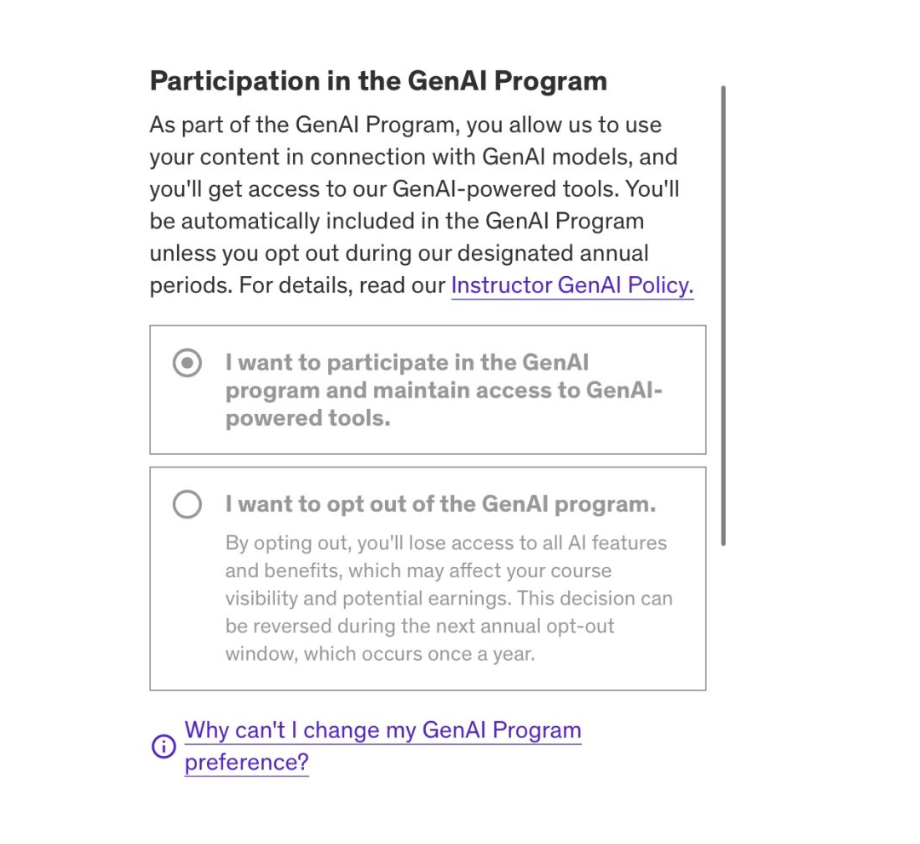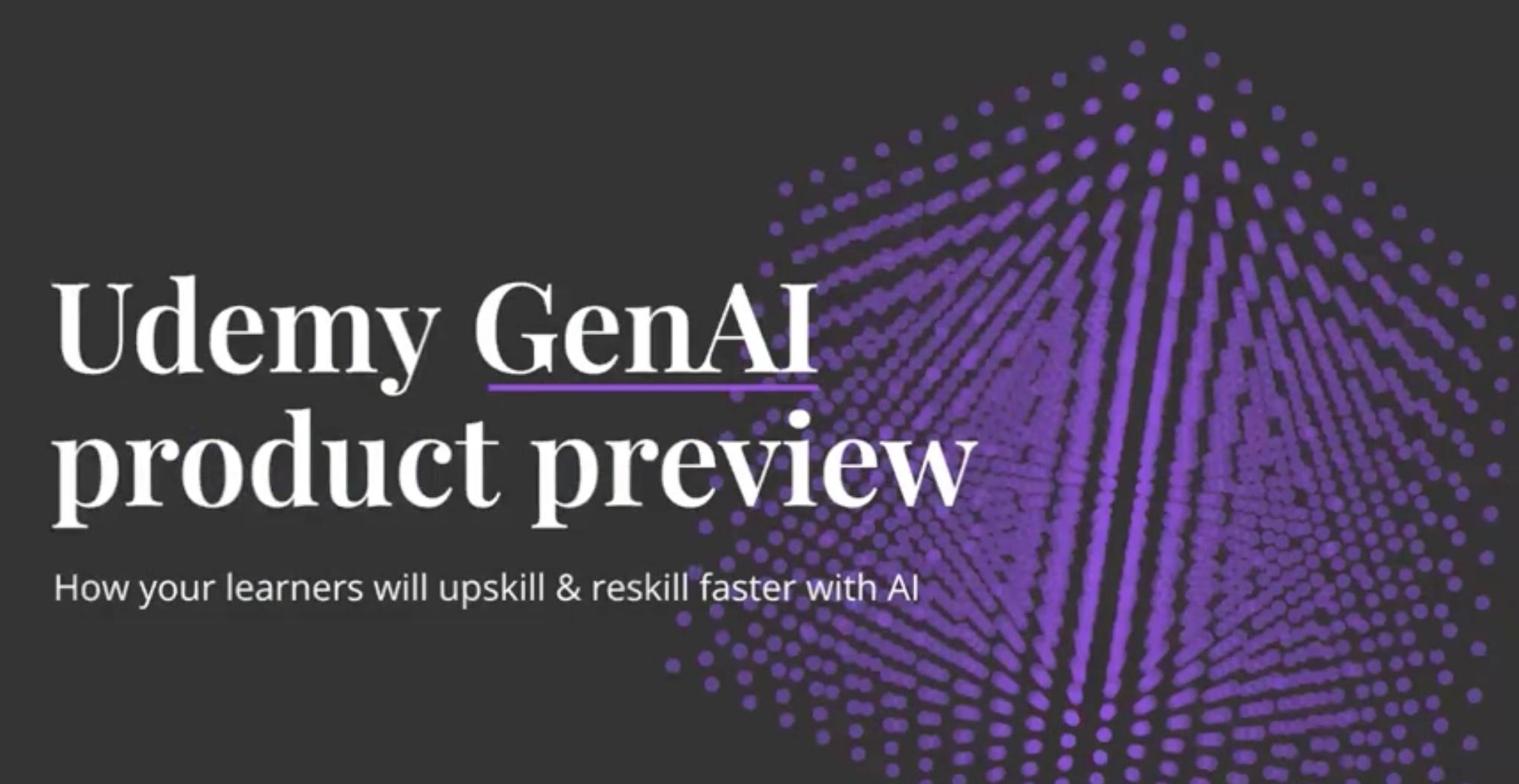Udemy, an e-learning platform with more than 250,000 online classes, recently announced that it would train generative AI on the classes that its users contribute to the site. Not only were class teachers automatically opted in to having their classes used as training, Udemy said teachers would have only a three-week “window” to opt-out of training. That window has now passed.
“We want to officially announce that the opt-out period for our Generative AI Program (GenAI Program) begins today, August 21st, and goes through September 12th. The choice to participate in the GenAI program is yours. If you want to participate, no action is needed!,” Udemy said in a post on its community forums August 21. In an “Instructor Generative AI Policy” document, it says it plans to offer “Annual Periods designated by us” during which instructors can opt-out of having their classes trained on, and said that when people opt-out of training, it will remove the instructors’ classes from its dataset “by the end of the calendar year.” It has also told instructors that “By opting out, you'll lose access to all AI features and benefits, which may affect your course visibility and potential earnings.”
With the first opt-out window having passed, instructors are now seeing a grayed-out option in their settings if they didn’t know about the window or would like to opt-out now.

This unusual time-based window for opting out is understandably upsetting some instructors. It also highlights the fact that removing training data from a large language model after it is ingested isn’t trivial, and raises questions about whether other platforms are consistently updating their LLMs after users opt-out.
“I never agreed to any changes to policy with Udemy over the last 5 years,” Katie Stegs, who works in mobile gaming and has a class on Udemy, wrote in a LinkedIn post. “Today I get an email about the new AI tools (big surprise) and when i go to opt out in the settings i find that the option is greyed out and that i’m only able to change my preferences during certain periods of the year that they say they will communicate to users?”
Stegs told 404 Media that she has had a course on the platform for eight years, and that she ended up finding out about the program with an email that said “You’re IN, Welcome to the GEN AI program.”
“This was the first I heard of it and I immediately logged in to the creator dashboard to turn it off,” she said. “The settings were buried away deep somewhere in my account. And then when i finally found it, the option to remove my consent from the program was greyed out. I never consented to the program.”
“I would like to remove my course from the platform but as the course was uploaded by my co-creator I can't do that part,” she added. “It's just unbelievable the theft of intellectual property that was never agreed to or communicated in a reasonable manner. It should be illegal. And on top of this, I should be allowed to withdraw consent at any time given it is MY content.”
Several other instructors have also said they intend to leave the platform entirely over the generative AI training, including the digital artist Hardy Fowler, who has a Discord community of 10,000 people and had many classes on Udemy until late last month.
“Just a heads up but I have officially parted ways with Udemy,” Fowler posted on Discord. “Words I never thought I'd say. Udemy is where I got my start as a teacher and it has been a great experience. It's where I met so many of you and for that I'll be forever grateful. It has been a bit of a death by a thousand cuts in recent years but the final straw was a new policy Udemy publicized last week involving instructor content being used to train Udemy's generative AI with opt out tools that seem deliberately difficult like we're seeing on so many other platforms these days. Nope."
Udemy instructors say that they believe it has recently become harder to make money on the platform, and earlier this week the company, worth $1.2 billion, announced that it was laying off 280 workers with the intention of rehiring people in places with lower wages. The company says it lost $50 million in the first half of this year.
In its Instructor Generative AI Policy, Udemy says that it will give instructors a revenue share if its AI features create new revenue streams, but it has been vague about how this will work. It has also told instructors that “Udemy does not have any plans or intentions of creating AI-generated courses that compete with instructors.”
The use of user-generated content to train AI models has been a consistent controversy across the internet over the last year or so, and, almost uniformly, platforms who are developing AI have decided to opt their users in by default. Udemy has been more transparent about this process than many other companies, but it’s easy to see how someone who is not constantly checking their Udemy account or Udemy community pages would have been blindsided by this change or could have missed emails about it.
Over the last few months, Udemy has been making posts on its community message board and website about the generative AI program. In particular, it has been telling instructors that its generative AI program will be good for its human instructors, and that “we respect intellectual property rights. We use AI responsibly and in support of our mission. We win together.” It has suggested that the generative AI program will “boost course engagement” and “increase content visibility” for instructors. “Our data suggests that offering more personalized learning options have the potential to drive increased engagement and revenue for both you and Udemy,” the company says on its page about generative AI.
This has led Udemy instructors to ask whether they will be penalized for not allowing their work to be used as the basis for Udemy’s AI training. In a question on its forum, an instructor asked “If we choose not to participate, will our courses be affected in any way with respect to the promotional/advertising campaigns that Udemy carries out?” Chrystie, a community manager and employee of Udemy, responded and said “I'd like to assure you that we will continue to surface courses of opted-out instructors through our core capabilities, such as search and recommendations, so non-participating instructors can still grow their success on Udemy. Undoubtedly, we expect GenAI to drive more attention to courses included in the GenAI program.”
Annual “opt-out windows” seem ridiculous on their face. But Udemy’s pages about its generative AI programs are more comprehensive than many others I have seen, and, in an email to 404 Media, Scott Rogers, the senior vice president of instructor and content strategy at Udemy pointed to the “substantial time investment” required to remove data that had already been trained on from its AI models. Rogers also said that new Udemy instructors will be allowed to opt-out of data training when they sign up.
“At Udemy, we believe our instructors should have complete control over their content. This includes deciding whether or not they want their content included within our GenAI models. We remain committed to working transparently with our instructors and protecting the rights of their content so they can continue to grow alongside our business in the ways that work best for them,” Rogers said. “To honor this commitment, we designed our GenAI program and models to exclude content from any instructors who have chosen to opt out of this program. That being said, given the substantial time investment required to ensure this content is completely removed from our GenAI tools, we’ll be offering this participation period window to all existing Udemy instructors on an annual basis, enabling them to reassess their participation each year as our AI tools continue to evolve.”
I find this answer to be pretty interesting, because no other large tech company that I’m aware of has comprehensively explained how (or even if) it will remove data from LLMs if that data has already been scraped. Last year, Meta launched a “data deletion request form,” but people who have used it called it “fake” and WIRED wrote that “in reality, there is no functional way to opt out of Meta’s generative AI training.” When we reported about the existence of child sexual abuse material being included in the training data of the massive LAION-5b dataset, the model was entirely removed from the internet for nine months while it was “cleaned,” and various academic papers have talked about potential methods for LLM “unlearning” and “retraining.” (One paper noted that “Unfortunately, Retraining LLMs repeatedly to eliminate undesirable knowledge is impractical due to their immense parameters.”)
Major companies like OpenAI, for example, are not launching new AI models on a daily or even monthly basis. A Udemy policy on GenAI explains, meanwhile, that “Udemy will regenerate or otherwise discontinue using any existing generative AI models previously developed or improved by us using your Submitted Content. To the extent that we can attribute Generated Content to your Submitted Content, we will no longer use it. However, any user who was provided with the Generated Content prior to your opt out will continue to be able to access that Generated Content.”


